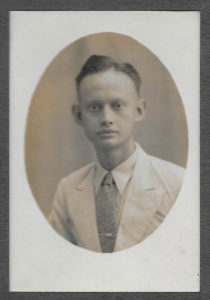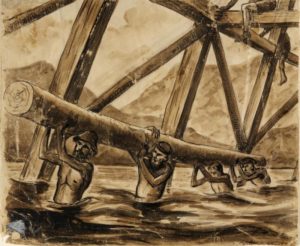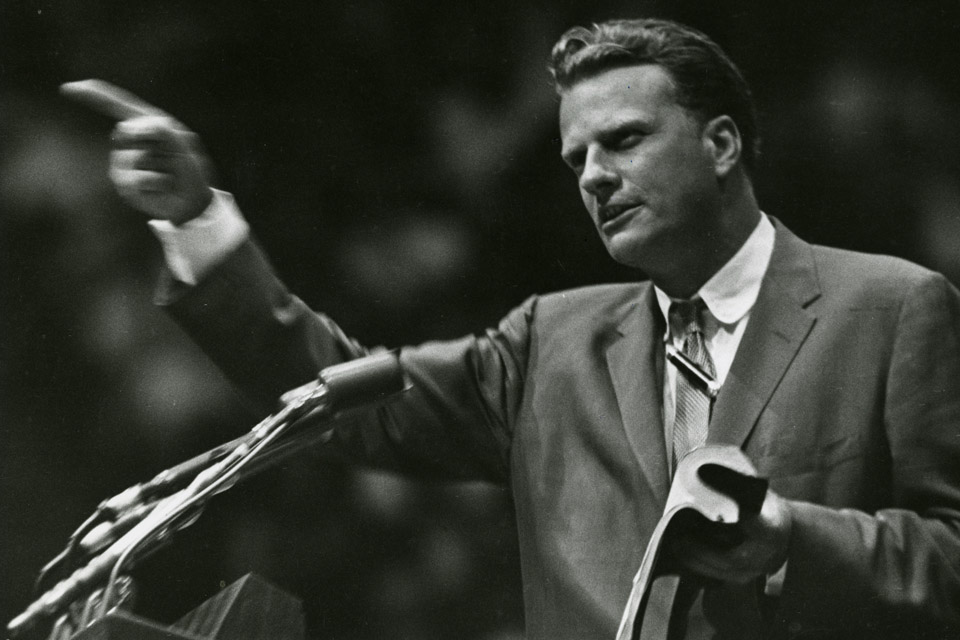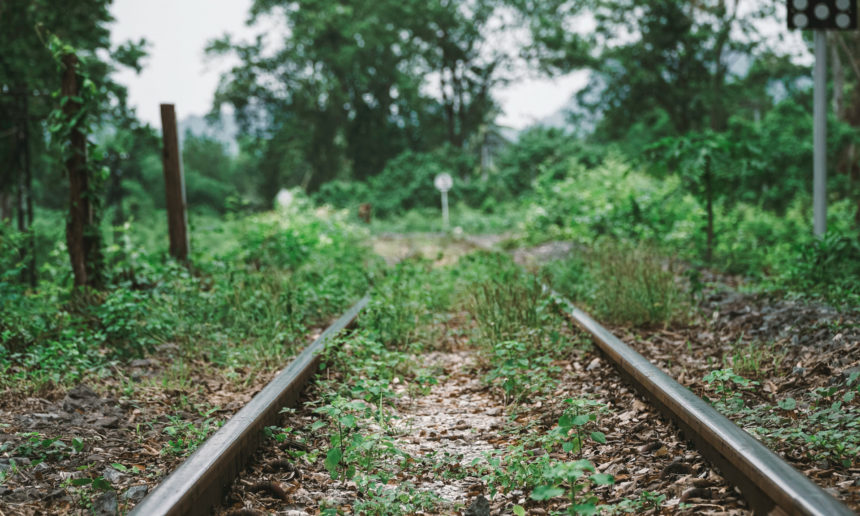Recently, I was digging through some old files and was surprised to come across a copy of my uncle’s Christian testimonial. A lengthy document, its aged paper and faded typewritten words made me curious to read more.
Born and raised in Indonesia, my dear uncle spent harrowing years as a WWII POW in a Japanese camp, and then after the war, he served as a Dutch diplomat in Japan until his retirement. Although it has been many years since he passed away, I still have fond memories of family gatherings and how he spoke of his love for Jesus. I believe he wrote this testimony wanting to share it with as many people as possible, and now it is being brought to light once more as “Finding Salvation by W.D. Pitton.”
A Personal Journey
 The following is the Christian testimony of my uncle, W.D. Pitton, written in 1977, while serving as a Dutch diplomat in Tokyo, Japan:
The following is the Christian testimony of my uncle, W.D. Pitton, written in 1977, while serving as a Dutch diplomat in Tokyo, Japan:
I have never been to a school or institution to learn English, a very useful language, and learned mostly by reading the English Bible. Besides showing more and more about God’s wisdom, it consists richly of profound, well thought out, meaningful words and is always a pleasure to read.
I have three elder sisters and three younger brothers. We were all brought up in a very strict Catholic home by our mother. For many years in my youth, I served in the Catholic Church as an altar boy, usher, and sang in the choir on Sundays.
Our father’s nationality was Dutch, born in Amsterdam of British ancestry. His religious faith was Protestant of the Dutch Reform Church. Mother was Armenian, born in Indonesia, and belonged to the Roman Catholic Church. I, myself, am Dutch, born in Indonesia.
While at a Billy Graham crusade in Japan, I became a Baptist on October 10th, 1967. During that crusade, the three letters, G-O-D and five letters, J-E-S-U-S, became clear, alive, and real. Millions of times, I had spoken those words with an earnest belief in God and Jesus, yet they were no more than just names that were cold, lifeless, and so far away from the real intention I had when I called on God or Jesus. I came to the conclusion that my life was based only on the principle that by doing the good things and avoiding the bad, I will please God and someday come to Heaven, as taught by my mother, “We are here on earth to serve God and so doing will come to Heaven.”
Dr. Graham said, “Life has its purpose. I am a sinner and in need of God’s forgiveness.” That evening, listening to Dr. Graham, I found myself. I found the real me, hiding for 49 years inside myself, and humbly asked God for help. My 12-year-old son, who guided me to the Budokan, a large indoor arena, was surprised when he saw tears in my eyes and softly said, “Dad, you cry.” Never before had he seen me in tears. I could only answer, “Yes, I am a sinner, Son, I have just realized that.”
God Sustains
 Born in a Christian home with only head knowledge of God was a great help of unusual strength when in the Second World War, I was taken prisoner by the Japanese and for a period of four years was sent via Singapore into the jungles of Thailand and Burma, to work on the Death Railroad (immortalized in the 1957 film, The Bridge Over the River Kwai).
Born in a Christian home with only head knowledge of God was a great help of unusual strength when in the Second World War, I was taken prisoner by the Japanese and for a period of four years was sent via Singapore into the jungles of Thailand and Burma, to work on the Death Railroad (immortalized in the 1957 film, The Bridge Over the River Kwai).
At first, I had a shirt, shorts, socks, and shoes but as the years went by, all I had wore out, and the last years I had left only one piece of cotton cloth, 20 cm by 80 cm, with a string at the end called in Japanese, a “fundoshi” (loin-cloth).
Here God proved to me that a person could live with almost nothing and really does not need to have so many things as we often think we do. All those four years, I never saw money, and with the ability to speak Dutch, English, Siamese, Indonesian, and Japanese, I claimed to be the cheapest paid interpreter.Â
The deeper into the jungle we went, the more difficult it became for the Japanese to carry up the food supply for us all. We ate snakes, lizards, iguanas, and all kinds of food we could catch to stay alive. Our daily food was more hot water than porridge or rice. Once, I can hardly forget, I got a piece of fish from the Japanese guard, and breaking it to eat, the mites came crawling out. I held it above the fire for a while and ate it all up. It tasted delicious.
By this time, cholera broke out, and there was no medicine, nothing. We all felt we were doomed to die, forgotten by the whole world and everybody, but nobody ever spoke a word about it. Work started at daybreak and lasted until sundown. The dates and days were long forgotten. Who cares about a calendar? The only way not to work was to be sick, which sometimes does not work out at all.
The man who slept next to me left for the lavatory at around 8 p.m., only never to return to the tent again. As healthy as he was, he died there. Another man, a Hercules who did bodybuilding, suddenly, while waiting in line for food, fell facedown before our eyes. He must have been dead while standing because he did not stretch out his hands while he fell. Cholera is a dangerous sickness. Our Dutch commander advised us to drink water with a few drops of oil (from the oil lamps). Some did, others did not. I did not.
One day I became sick. I was discharging blood. I thought that it was my end. Moreover, I could not speak about it because nobody cared for anything but themselves. My only concern was how my family could find my grave. I looked around but saw no landmark or even one spot to find the camp again. It would be covered with bushes in no time.
All alone, I went to the graveyard to imagine where I will be laid down. I did not cry or pray; my mind was blank. After a while, I thanked God for my life so far. Looking down at the latest grave, I could not remember his name. We all lost interest in dead people. We all must have had the same thought, “Today he dies. Tomorrow maybe it will be my turn.”
Miraculously, God spared me. Also, my two brothers, who I accidentally had been given a chance to meet on two different occasions, came out of the jungle alive. Both times we met, I was much better off than them, and I gave all I had, salt, my hat, and even dark glasses that I needed so badly with my weak eyes. Our reunion was emotional and separation heartbreaking.
When the war ended in August 1945, I was sent back to Indonesia and later to Japan, where I arrived on March 17, 1947. I actually entered Japan on approval of General MacArther’s G.H.Q. From that day on until today, 30 years later, I served more than ten ambassadors of my country. Needless to say, Japan became my second fatherland.
My Conversion
A few weeks before the crusade began, I read a roadside sign near the Budokan, saying that Billy Graham will speak at that arena. At first glance, I began to recall the name, and somehow, way back in my mind, I remembered that he was a preacher. I began not to like him simply because I do not like the word “protest,” which is a word with a bad connotation (although my father was a Protestant). I was a Catholic.
For some unexplained reason, that billboard kept coming back to my mind while at home, while I walked, or drove. It hindered even my whole family because I had been talking about it too many times. Once, my wife said to me, “You are a good husband. You do not need to be better.” As the opening date neared, it even upset me from time to time, and finally, she said, “Why don’t you go there, listen briefly and come back so you can get over it and forget the whole billboard.”
It seemed to me to be the only solution left to release me from that pressure. When I got up on the 10th, same as the days before, I clearly saw it again and knew that it would be a terrible day for me. During my working hours, the thought was there, and when I finished work, I really wanted to go and hear Billy Graham. I knew I was late, it ought to have started a half-hour ago, and I had just come home. I invited my family to join me, but only my son responded favorably. “I want to hear him,” I said. I can still hear the front door click when I closed it, and the two of us were on the street to find a taxi.
Suddenly, a strange feeling came over me, and after a while, I could not keep it to myself any longer and told my son, “I do not know what will happen to me, but I am sure you will never forget this day.” He did not speak a word. We found a taxi, and I asked the driver to rush us to the Budokan, being late. Near the place, just in front of the British Embassy, there was a traffic jam, and I lost my patience and began to grumble. Finally, my son spoke three words, “Dad, stay calm.” I looked at him and calmed down. Finally, we arrived, and there was a line of people outside the building, along the stairway, from the ground floor all the way to the third floor.
Having never entered the building before, I handed my son money to buy the tickets and asked him to find the main entrance so we could get in faster. In the meantime, I joined the first and shortest line. My son came back smiling and said, “It’s free, Dad.” After that, the line began to move, and when we entered in from the top floor, we saw it had not even started yet.
Mr. Burrows was still busy rehearsing the choir. Inside, there were thousands of people waiting. I still remember the yellow flowers in front of the stand, way down below. “Dad, wait here.” Said my son, and he was gone to find our seats. In such a crowd, I thought to myself that he would never find me again. He came without his coat on and asked me to follow him. We had two seats. My son was sitting in front of me on the lower row.
After introductions, the choir sang, and Jimmy MacDonald sang a solo about wanting to be a Christian. Then, Dr. Graham took his stand behind the pulpit, and Rev. Hatori interpreted the message in Japanese. I was all quiet and concentrating on what he would say, trying not to miss a word. Dr. Graham’s voice was clear and sounded like a trumpet. I was surprised. Within a short time, I felt as if it would be a personal matter between us and surely not meant for all the others. Moments later, I was sure it was meant for me alone.
Then came that shocking moment when pointing at me, he said, “All have sinned and come short of God’s glory.” His index finger must have been one meter long. It seemed as if I was awakening from a 49-year-old dream.

I began to think about my past, asking myself what I had done all those years. Then there came moments that I was carried away with my thoughts and came back to listen again. Listen again for a while, and then I was off again checking on my past years. So it went on and on, always asking myself, “What have I done all this time?”
I concluded that although my life was good, I really had never offered it to Jesus, who died for me. I recognized my unworthiness and felt sorry for Jesus for all that he did for me. In all quietness and sincerity, I asked Jesus to crucify me so we can be even. I simply cannot accept His goodness to die for me. My heart was crushed. At that very moment, with flesh and bones and whole body, I could feel that Jesus is alive. (While typing these letters, I wish I was smarter and able to express myself more clearly to make you understand). I felt lost. The more I listened, the more my guilt came out.
At the end of that sermon, he gave an invitation of open confession. Never before in my life, in all the churches I went have I ever been asked to do so. With my head, heart, and whole body already there (so wanting to go), I could not move my legs. I felt glued to the seat. It was a hopeless situation, and I did not know what actually to do.
Then my son turned his head, looked me straight in the eyes, and said, “Dad, let’s go.” I jumped in the air and, with my mind set on a living Jesus, walked down and was so sure of myself that even a one-meter-thick solid iron wall could not have stopped me. I’d get right through it!
Guided by my son all the way down, I looked closely at the man who knew me so well. I was asked to pray, I did. The hardest thing in that prayer was asking for forgiveness, and I could not do so without shedding tears. As I said before, it surprised my son. “I am a sinner, son,” I said. After the prayer, two men came up to me. First, pastor Moorhead (the pastor of the Tokyo Baptist Church, who baptized me) and later on, an air force officer. Both encouraged me for a better future, and I felt relieved, smiled, and my son and I returned home.
In the taxi, we were almost silent. “How do you like it, Dad?” asked my son. “It is good. I am glad I went and will go again tomorrow,” I answered him with a tired voice. Oh, how I wished I could write all I went through on a billboard for everyone to receive God’s mercy as I have experienced it. Such an everlasting blessing in such a short time.
I do not think that God made special people, we are all getting His love, just the same, but some are not willing to hear His voice. (May you, reading this, can try to go and listen, even once, for a brief moment as I did, please).
You can listen to Billy Graham’s message “Bountiful Blessings in the Budokan” from Tokyo, Japan, 1967.
Newly Saved
Out of all the ten days of the crusade, I had not missed one, even the very last at the Korakuen Stadium. Except for this last one, I came forward every time they gave an invitation, not for repentance anymore, but for showing the people that I am a sinner, regardless of nationality, profession, or status. I am not ashamed; I am proud to do so.
Thanks to God, who shows me that He is alive and able to forgive. Thanks to my wife, who said, “Go and hear,” and thanks to my son who guided me all the way in a manner so beautifully described in Isaiah:
Isaiah 11:6: “The wolf also shall dwell with the lamb, and the leopard shall lie down with the kid; and the calf and the young lion and the fatling together; and a little child shall lead them.”
I have received God’s peace, the supernatural peace. The peace I did not quite understand before. The kind of peace that the angels said when Jesus came:
Luke 4:14: “Glory to God in the highest, and on earth peace, good will toward men.”
The same peace that Jesus, when He was about to leave for Heaven, said:
John 14:27: “Peace I leave with you, my peace I give unto you: not as the world giveth, give I unto you. Let not your heart be troubled, neither let it be afraid.”
This peace is my strength in my life. I have been a member of the Tokyo Baptist Church for many years now, serving as a deacon, Sunday school teacher, and singing in the choir. Now, a grandfather, I still feel young, and I am the happiest man in the whole world, no matter how bad it is, as others say. I can smile and shall not complain. Life is beautiful with God, who is all, and all beauty.
“Finding Salvation by W.D. Pitton” Related Articles
==> Also read “Thank You Billy Graham.”
==> And read “Called to Serve God and Country.”


